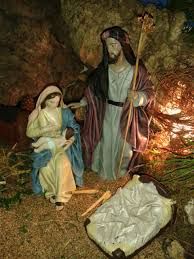For the Christian, work, waiting, and worship shouldn’t be separate events.
Work, Waiting, and Worship
IT’S WORTH CONSIDERING
Our Western mindset causes us to see work, waiting and worship as separate entities-distinctly different events which occur at different times. We compartmentalize them on Sundays as we divide our church services into separate times of praise and worship, offering, announcements, sermon, communion, etc. The Eastern mindset – Jesus’ mindset, sees no such distinctions. His Father saw them all at once, and so did He. Follow His life closely and we’ll see them blended together no matter what the situation.

AS I SEE IT
 |
|
Drawing of Abraham at Oak of Moreh
|
From the oak of Moreh, Abram traveled south to a location between Bethel and Ai. There he built an altar (of separation-between heaven and hell) and he called upon the name of the Lord. At Shechem God had promised the land to Abraham’s descendants. Here, God wasn’t asking for Abraham’s obedience. He was simply asking Abraham to believe that God would keep His promise. Later, in Genesis 15, God would elaborate on this promise by assuring Abraham that His descendants would not only live in the land, but would be as numerous as the stars in the night sky.
At this point Abraham didn’t just believe in God’s promise. He believed in the Lord (Gen. 15:6). This, I believe, is where Abraham received salvation (Gal. 3:8) and became the father of the faithful-all those who would receive salvation simply by believing apart from works. Here we see God’s chosen method of dealing with people. God blesses and we obey out of gratitude, not in order to be blessed.
When Abraham built these two altars, I believe he understood this. God’s promise to bless was, in his mind, as good as done, so he obeyed God by worshiping Him, and He worshiped God by giving back to God the blessing he had received. He engaged in what I see as spiritual recycling in which whatever God gives to us makes its way back to Him. This brings us back to the title of today’s article. When our trust in our Lord is rock-solid, His promises are certain, and our times of waiting can be times of worshiping as we rest in God’s constant work on our behalf. Then we can be more like Jesus as learn to engage in all three at the same time.
ON THE LIGHTER SIDE
Even duct tape can’t fix stupid, but it can muffle the sound!
ATTRIBUTIONS
Inclusion of photographs and/or images in no way implies the endorsement of this blog or its information by the photographer or designer.






Leave A Comment